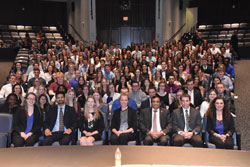Dr. Janice Stapley, an associate professor of psychology, was honored at the annual conference of the National Academic Advising Association (NACADA).
Her study, “An Examination of Academic Advice Seeking Within an Emerging Adulthood Framework,” examined the needs of special populations and the general population of undergraduates through a developmental lense, and received the competitive peer-reviewed grant.
Stapley stated that she was very excited and happy with her dedication to the process. “I am particularly happy to have funding from an organization that does crucial work in advocating for students,” said Stapley.
NACADA is an international educational association of individuals engaged in academic advising, and committed to enhancing the educational development of students.
Its more than 10,000 members include professional advisors, counselors, faculty, administrators, and students. NACADA, an external funding source, honored Stapley with the grant. Stapley said, “The main thing I’d say is that in 24 years here at MU, we’ve moved towards more support of external funding,” said Stapley.
Through her work, Stapley has found that students are satisfied with technological responses, such as emails, to answer quick questions, but prefer to meet in person with advisors for bigger issues.
“Although we’re in a digital age, just because students text their friends, doesn’t mean they want to text us,” Stapley said.
Stapley believes that unless one is the student who needs advising in a particular situation, one cannot fully understand the stress that is felt by that student.
Her main focus in her work is finding out what students want and need.
Stapley’s grant was 15 pages in length, with a very specific format. The average time it takes to write and prepare a grant is about 4 months, according to Stapley. A board of NACADA researchers reviews the grants, and according to Stapley, rarely accepts first submissions.
This is the second grant Stapley has written. “I was turned down my first time by NACADA, but they gave me constructive feedback, and I tried again.
One of the most important things you need to get a grant is persistence. Students get insulted when they must revise or rewrite a paper, but as professionals, we still do that too,” Stapley said.
Stapley has been previously published in the NACADA Journal with her colleague Kerstin Bothner in 2013 with their article titled, “Academic Advising: The Key to Increasing Retention among Students with Anxiety Disorders.” This article was also published in Academic Advising Today.
Stapley specializes in adolescent development, ages 18-29. She explained that in today’s society, adolescents develop a little differently and have higher rate of anxiety.
Stapley also studies those with mental health issues, and stated that these students tend to have a much lower graduation rate than those without.
Stapley believes chronic illness affects student’s college experience as well, which is stated in her article written with University alumnus Katie Houman, titled “The College Experience for Students with Chronic Illness: Implications for Academic Advising.”
“I always include students as assistants in my research to allow them to get the full experience of working towards getting the grant, being published, etc.,” said Stapley.
An article titled, “The Demise of In Person Academic Advising is Nowhere in Sight,” written by Stapley and University alumnus Jennifer Noonan, will be published in March 2015.
When her writings are published, Stapley always has her students be the first author to take credit for the writings.
“That’s not an accident. I’m always the second author because it’s more important to my students. I like doing research and having an active lab, but my main goal is obtaining opportunities for my students. Being rich and famous isn’t my goal. I want to help my students further their careers,” said Stapley.
Gary Lewandowski, Chair of the Department of Psychology, congratulated Dr. Stapley on receiving the NACADA grant. “In a department of stellar academic advisors and mentors, Dr. Stapley has taken a leadership role in the scholarship of advising, and has done outstanding work continuing our department’s tradition of fostering faculty-student collaborations,” said Lewandowski.
Stapley has held many positions here at the University. She was a first year advisor, then the Chair of the Psychology Department for six years, and then the Psychology Department Advising Coordinator for a decade.
Stapley received her undergraduate degree at Russell-Sage University, and her masters and Ph.D. at Rutgers University. Her inspiration for her work as an advisor comes from her experience with her own advisors.
“As an undergraduate at a small school, I had excellent advising with sit down encounters with my advisors. I got a lot of support from them,” said Stapley.
Stapley hopes that her work will positively affect the University as a whole. “I’m hoping to have better informed academic advisors that focus on what students want. I hope to continue this line of research and continue to work with students,” she said.
Jason Caianiello, a senior psychology student of Stapley’s who has been working closely with her on her research, states that Stapley’s method of teaching is one that differs from many other professors.
He said, “Dr. Stapley makes an effort for us to apply the principles we learn in the classroom to real world experiences such as current events and our personal experiences.
Beyond the realm of the classroom, Dr. Stapley has helped me grow as a psychology student here at Monmouth.”
Through Stapley’s courses, Caianiello says she has helped him prepare for his senior thesis, provided opportunities for his classes to network with successful alum, as well as taught him many different research methods complete with real laboratory experience.
“I believe that Dr. Stapley has the passion to create a better advising system here at the University to benefit all students,” Caianiello said.



